PRINCETON, NJ -- Among women, Democrats maintain a solid double-digit advantage in party identification over Republicans, 41% to 27%. In contrast, men are equally divided in their party loyalty between Republicans (28%) and Democrats (30%), and are currently most likely to say they are politically independent (40%).
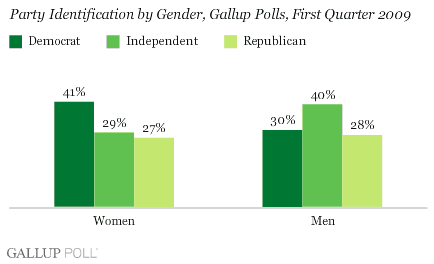
These results are based on aggregated data from Gallup Polls conducted in the first quarter of 2009.
The current results for women are typical of what Gallup has found over the past year, with roughly 4 in 10 identifying themselves as Democrats. The Democratic Party has held an advantage among women in Gallup polling throughout this decade, with support usually in the high 30% range. The current 41% female Democratic identification matches the high achieved several times since 2000.
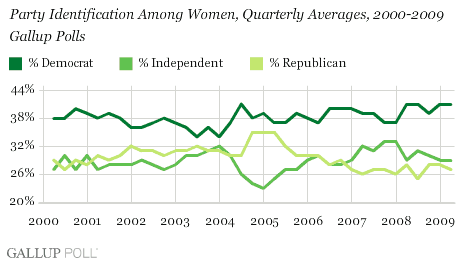
At various times over the past decade, the plurality of male partisans have shifted between Republican and independent identification, with no more than 31% of men identifying as Democrats in any quarter. Since late 2006, however, the gap between the percentage of men identifying as independents and the percentage identifying as Republicans has grown, and independent men have outnumbered Republican men for the last two years running. Over this time, Republican identification among men has largely been on par with Democratic support, a clear negative sign for the GOP given the solid support the Democratic Party has among women.
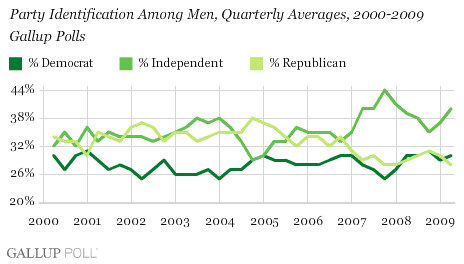
Party Support Including Leaning Independents
Women's affinity for the Democratic Party looks even stronger when independents' partisan leanings are taken into account. By this measure of party identification, Democrats currently enjoy a 22-point advantage over Republicans, with 57% of women identifying as Democrats or saying they are independent but leaning Democratic, compared with 35% who identify with or lean to the Republican Party. This gap is one of the largest Gallup has measured in any quarter this decade.
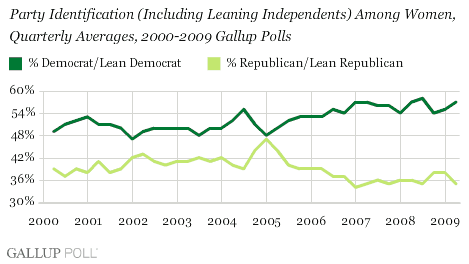
Among men, the Democratic and Republican Parties have been more closely matched on this measure of party identification thorughout this decade. However, the trend is clear -- the advantage Republicans held for much of the 2000s disappeared in 2006, and Democrats have maintained at least a small edge since then. In the most recent quarter, 47% of men identified as Democrats or leaned Democratic, compared with 42% who identified as Republicans or leaned Republican.
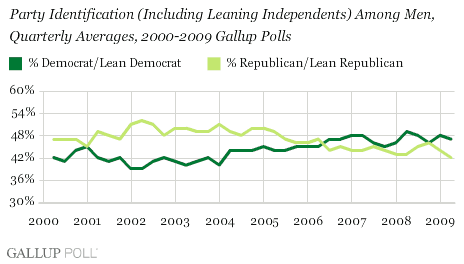
Implications
The last three years have brought little in the way of good news for the Republican Party, including two decisive national election defeats. During this time, Democrats have expanded their advantage in party identification nationally and have solidified their support among women. Republicans' former advantage over Democrats in leaned party identification among men has disappeared, though the parties remain competitive.
If there is any silver lining for the Republican Party, it is that while men have become less likely to identify as Republicans, they have not necessarily moved in great numbers to the Democratic Party, but instead have shifted more toward an independent political orientation. That would seem to indicate at least a possibility that men who formerly identified as Republicans could someday return to the Republican fold.
Survey Methods
Results are based on aggregated data from several polls, each consisting of interviews with approximately 1,000 national adults, aged 18 and older, conducted between January and March 2009. For each poll, one can say with 95% confidence that the maximum margin of sampling error is ±3 percentage points.
Interviews are conducted with respondents on land-line telephones (for respondents with a land-line telephone) and cellular phones (for respondents who are cell-phone only).
In addition to sampling error, question wording and practical difficulties in conducting surveys can introduce error or bias into the findings of public opinion polls.
